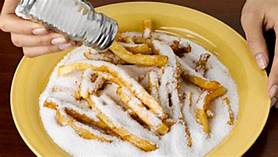Importance of well balance diet
All food contains all of the nutrients we need to be healthy, it is necessary to eat various foods in sufficient amounts. A good diet will include many different foods, and sufficient in quantity and quality to meet an individual’s need for food energy and other micro nutrients.
PEACHES AND NECTARINES
Typical serving size:
1 medium peach (35 oz or 98 g) or 1 medium nectarine (5 oz or 142 g)
HOW THEY HARM
Allergies
Cyanide poisoningWHAT THEY HEAL
High cholesterol Cancer Chronic diseases Weight loss Constipation Nerves Muscles Nutritious and versatile, peaches and nectarines can be enjoyed fresh, added to fruit salads, or cooked with meat and poultry dishesThey can also be baked, grilled, broiled, or poached to create pies, cobblers, and other desserts
The color makes a slight difference: White peaches and nectarines are sweeter than the orange and yellow varieties
Nectarines, which are often described as peaches without the fuzz, are especially high in beta- carotene, an antioxidant that the body converts to vitamin A
They provide some potassium and vitamin E as well as C and E
Health Benefits
Lowers cholesterolPeaches and nectarines contain fiber, especially pectin, a soluble fiber that is instrumental in lowering high cholesterol
Protects against cancer
The flesh of peaches and nectarines are rich in antioxidants—especially carotenoids—that help to protect against cancer and other chronic diseases
Encourages regular bowel movements
The skins of nectarines contribute insoluble fiber, which helps prevent or treat constipation
Aids in weight loss
For those watching their weight, peaches are a healthy way to add sweets to the diet
Canned and frozen peaches are higher in calories than fresh; a cup of sweetened frozen peaches contains 235 calories, compared to 190 in those canned in heavy syrup and 110 in juice- packed brands, whereas a fresh peach has only about 40 calories
Because peaches are a good source of dietary fiber, you’re more likely to feel fuller longer
Boosts nerve and muscle health
Two small peaches or nectarines have slightly more of the essential mineral potassium than a medium banana
Health Risks
Allergic reactionsDried peaches often contain sulfites, a preservative that produces an allergic reaction in susceptible people
Peaches may produce an allergic reaction in people with
Allergies
to related fruits such as apricots, plums, and cherries as well as almondsThey also contain salicylates, which may provoke a reaction in aspirin-sensitive people
Pits may cause cyanide poisoning
Nectarine and peach pits contain amygdalin, a compound that releases cyanide in the stomach
Although accidentally swallowing an occasional pit is not harmful, consuming several of them at a time can cause cyanide poisoning
Allergies
Buying Tip
s
Purchase fruit that is moderately firm
You should be able to smell the peachy fragrance
It’s an early sign of decay
Peaches do not increase in sweetness after picking
Storing Tips
QUICK TIP:
Prevent browning Cutting or peeling a nectarine releases an enzyme that causes a darkening of the flesh that does not affect flavor or nutritional valueThe discoloring can be slowed by immediately dipping the fruit in an acidic solution (for example, a tsp of vinegar diluted in a cup of water) or tossing sliced nectarines with a little lemon or lime juice




